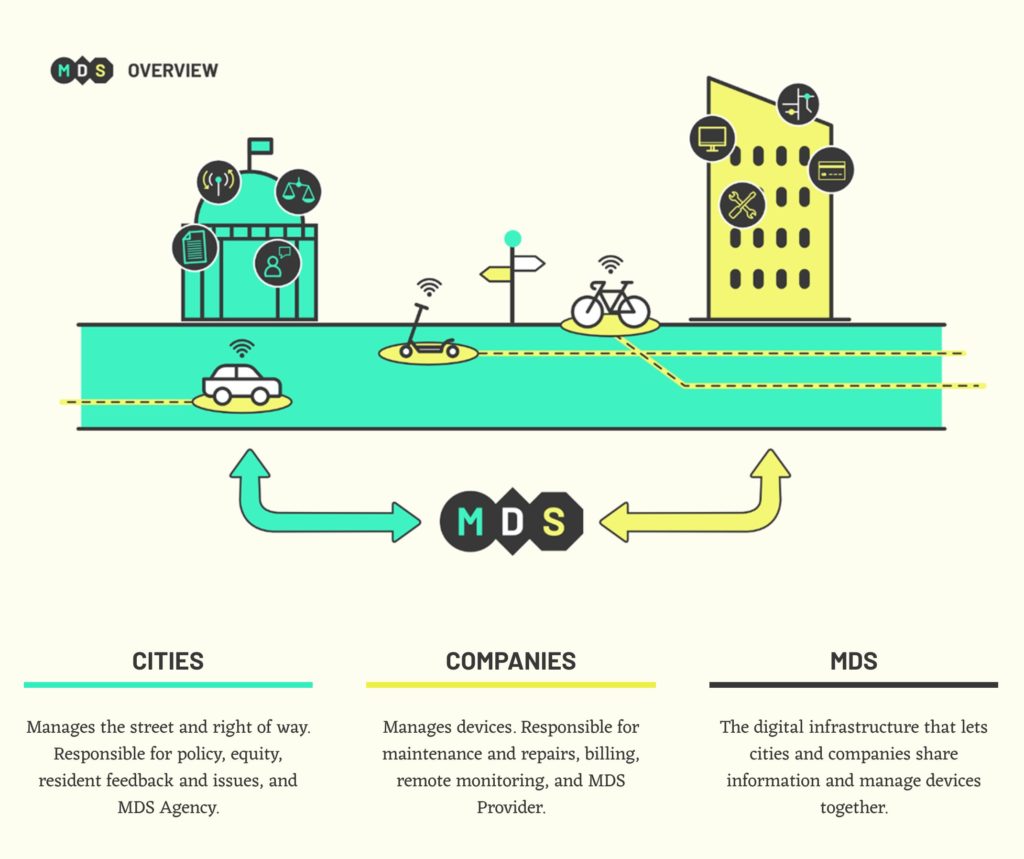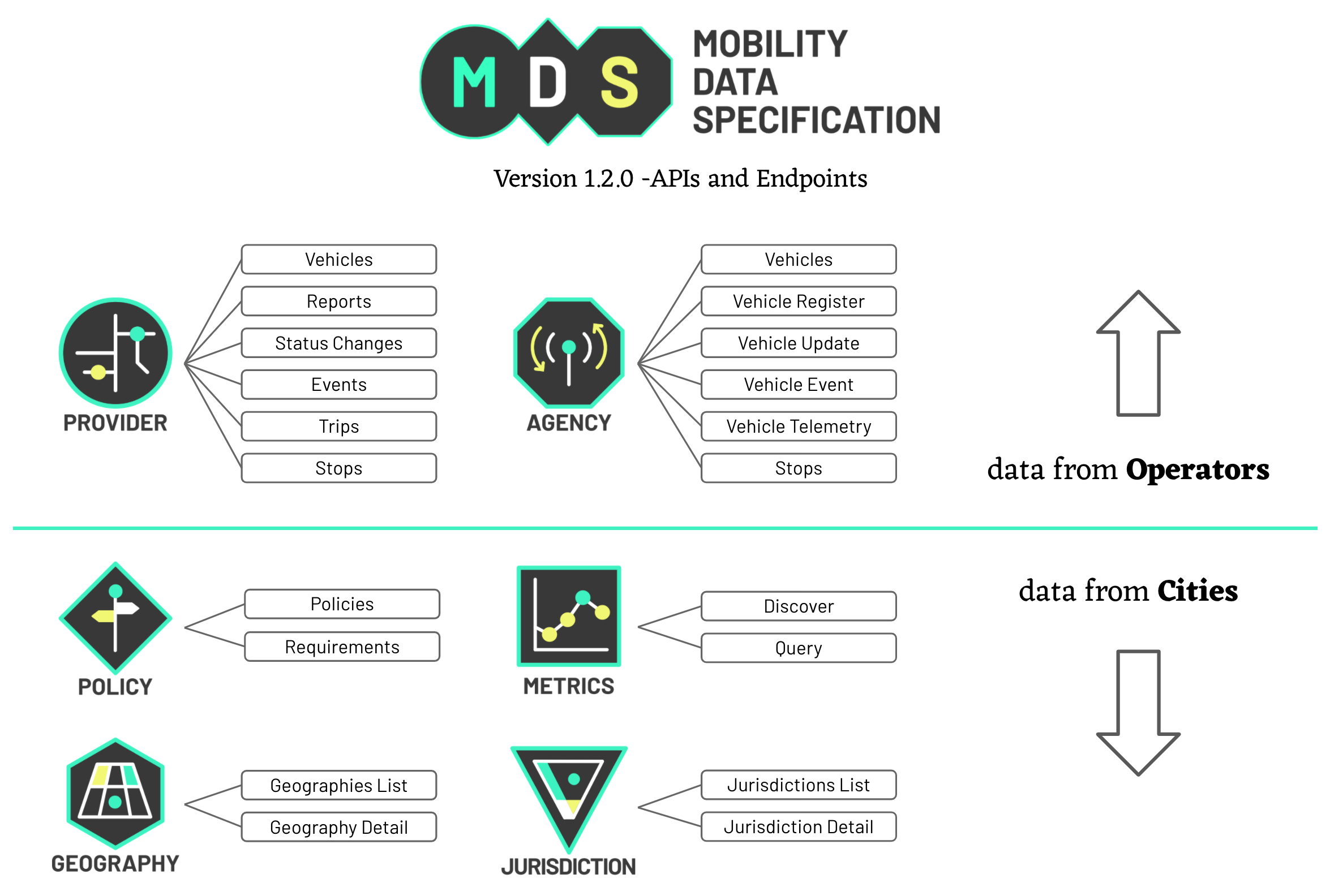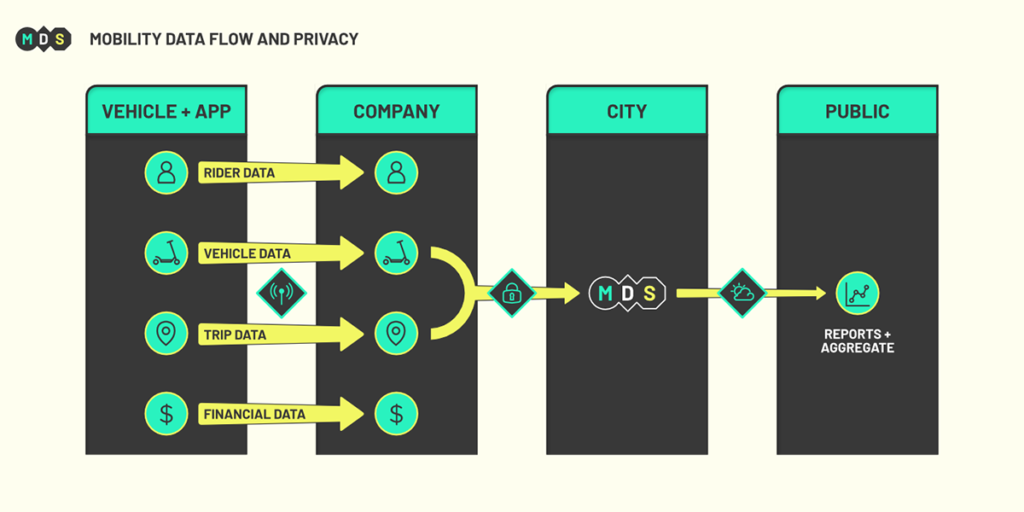The Mobility Data Specification (MDS) is a powerful tool for cities to manage the public right of way, but can researchers use MDS data to study mobility issues? This guide explores the ins and outs of MDS for research.
ABOUT MDS
Managed by the Open Mobility Foundation (OMF), MDS is an open source tool that is used in more than 130 cities across dozens of countries. Designed for use by mobility providers and the public agencies that manage shared mobility programs, MDS enables regulators to monitor how shared mobility vehicles are deployed and used for the purposes of planning, program management, and operations.

Because it is a flexible, free and open-source tool, no two cities will use MDS the same exact way. But, there are many common use cases, including:
- Vehicle Caps: Determine total number of vehicles per operator in the right of way
- Distribution Requirements: Ensure vehicles are distributed according to equity requirements
- Restricted Area Rides: Find locations where vehicles are operating or passing through restricted areas
- Resident Complaints: Investigate and validate complaints from residents about operations, parking, riding, speed, etc., usually reported through 311
- Infrastructure Planning: Determine where to place new bike/scooter lanes and drop zones based on usage and demand, start and end points, and trips taken
MDS is a two-way street – it also provides a digital mechanism for cities to communicate rules and regulations clearly to mobility operators.

UNDERSTANDING THE DATA IN MDS
MDS data is derived from dockless shared mobility vehicles deployed in the public right of way. It can include information about the status of vehicles, their location, and where they are going. While MDS does not convey personal information about the users of shared mobility services, data collected about mobility can be sensitive. All MDS users – including researchers – should treat this data as potentially sensitive and carefully consider and manage risk throughout the process of working with MDS-derived or any mobility data. To learn more about best practices for privacy, please see the MDS Privacy Guide for Cities (section on Sharing with Academic Institutions or Researchers).
While the OMF is the steward of MDS, we do not handle MDS data directly or have access to MDS data feeds from providers. We also do not build data processing implementations of MDS, but instead reference external open source tools built by the community. MDS is used by operators and cities, and the OMF convenes these groups along with other stakeholders to develop the specification.

MDS AND RESEARCH
While very few non-commercial studies using MDS data have been published publicly, UPenn MUSA’s analysis of Scooter Equity and Demand Analysis across 10 cities is a good example of what can be achieved using data derived from MDS. MDS data could be used to answer research questions like:
- How scooter placement / availability affects travel patterns
- How weather or road conditions affect ridership
- How different city scooter policies can affect ride choices
- Determining use cases and what’s possible with MDS
- Methodologies to aggregate MDS-derived data for open data publishing
Because of data sharing restrictions or limitations in strictly using MDS data, it is not well-suited for studies that involve:
- Any information about riders, including demographic information
- Understanding repeat trips by the same rider
- Financial costs around ridership or MaaS integration analysis
WHERE TO FIND MDS DATA
There are a couple methods researchers can use to access MDS data, each with their own pros and cons.
Using Open Data
Some cities share open datasets. These are created by further processing MDS data to address privacy considerations. These datasets are openly accessible and available, and there is no need to establish a data sharing agreement with a city or company to get started. Because these datasets are provided by cities, they can answer questions about multiple operators in that city. But, using open data is not an effective means of comparing shared mobility services across multiple cities. Given that these datasets are least sensitive in terms of personal information, this is a good option for those who do not wish to handle sensitive information. However, the level of aggregation and other processing can make this type of data less effective in answering certain types of research questions. Find more information about open/public mobility data sets, and information about approaches to anonymization here.
Working with Cities
Another option researchers have is to work directly with cities using MDS. MDS data is anonymized to a certain degree, but is still considered sensitive and would require appropriate data privacy practices and policies, plus a data sharing agreement of some kind. This type of data is authenticated and would give a higher level of detail on a city-level, but is limited as a means of comparison across multiple geographies without a data sharing agreement with each jurisdiction. Also, cities may have unique barriers that prevent them from working with researchers. For example, local laws or policies might restrict the ways in which they can share data. Or, the city may not handle MDS data directly and instead use a vendor for data aggregation, visualization, and analysis. If that is the case, you may consider developing a partnership and data sharing agreement that allows you to work with a city’s data vendor.
Working with Operators
Last, some researchers may choose to work directly with mobility service providers, using data that is typically included in MDS or otherwise. This also poses unique challenges, as operators handle the most sensitive types of mobility data. Handling mobility data from providers would require putting appropriate data privacy practices and policies in place, and likely would require a data sharing agreement of some kind. Plus, data from a single provider – even if it is across multiple geographies – still presents some limitations in answering some types of research questions specific to individual cities.
TIPS FOR ACCESSING MDS DATA
If you’re interested in working with a city or company directly, here’s some steps you might take:
- Understand local laws and policies that might restrict the ways in which cities or companies can share data
- Read the city operating permit to know what data the city requires from operators, and how it’s being used
- Work with cities or companies to determine what study areas or research outcomes could be mutually beneficial and align with their needs
- Build a relationship with staff for future, repeat collaboration
- Work with the city or operator to put the appropriate privacy policies for sharing in place, and create and sign a data sharing agreement
- Consider agreeing to publish your research and results publicly, which may help cities or companies prioritize the work
HOW THE OMF CAN HELP
As the organization that develops MDS, providing governance, guidance, and convening around it, the OMF can help researchers with some aspects of this work. For example, we catalog all publicly known MDS users, permit agreements, and publish links to open data on our website and in our State of Practice. You can also view our use case database to see what regulatory questions can be answered using MDS, and the OMF may be able to connect you with cities in our membership.
Still have questions? Get in touch.




